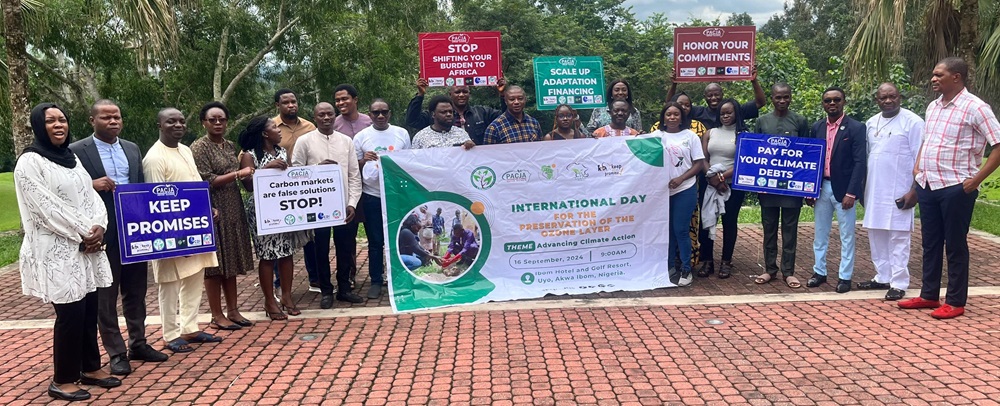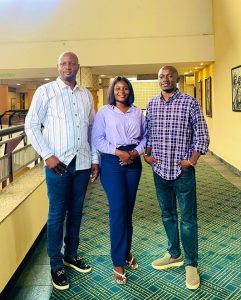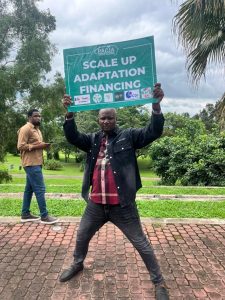
Reported by Mariam Idris
Climate and Sustainable Development Network participated in the African Activists Climate Justice (AACJ) Nigeria Country Planning Workshop convened on September 16-18, 2024 at Ibom Resort Akwa-Ibom State, to evaluate the project’s progress and plan for Year 5.
The workshop brought together representatives from various partner organizations, were Oxfam, Natural Justice, EVA, HEDA, ICCDI, GIFSEP, and YMCA. The aim of the workshop was to share learning outcomes, consolidate Year 5 activities, annual narrative plan, risk analysis matrix, consolidate results framework.
The AACJ project has expanded significantly in recent years, necessitating streamlined coordination and delivery mechanisms to ensure maximum impact and achieve its ambitious climate justice goals. This workshop aimed to galvanize the AACJ consortium to share learning outcomes and consolidate plans for Year 5.
The workshop provided a comprehensive review of the AACJ project’s activities, highlighting successes and challenges faced by various partners. Case studies were presented to illustrate successful project interventions.

It focused on consolidating the AACJ Result Framework, outlining expected outcomes and outputs for each pathway. Joint activities for Year 5 were discussed, including a major close-out event, participation in World Environment Day and International Women’s Day, and continued youth engagement initiatives.
CSDevNet’s Programme Officer Mr. Paul Joseph underscored projects implementation challenges and lessons learned for the past four years of project implementation.
He stated that “grassroot and vulnerable communities needs funding support to adapt to the impact of climate change”.
As the phase out of the AACJ project draws closer, the country lead Mr. Kenneth Akpan stressed for collaborative proposals and joint activities to put out the great work and impact the project has achieved for the four years. He State that “As a consortium tapping into the government ecological funds is pivotal for the project sustainability”.
The Finance and Admin Officer Mr. Umoru Ameh stressed on the need for increase budgetary allocation due to the high inflation rate in the country, underscoring the need for local funding action to support climate justice initiatives in communities. He noted that, “transparency and accountability is key to accessing climate funds”.
Highlighting success stories for the past four years, Miss Mariam Idris the Programme Assistant explicated on the organization’s impact at the national, state and local level.
She said, “we need action from the government on implementation of policies with strict adherence for a better and healthy environment”.

“Nature needs us and we must accordingly”, she asserted.
During the event CSDevNet had marked the International Day of the Ozone Layer urging the government to fulfill its commitments to climate action, coinciding with the International Day of the Ozone Layer. Emphasizing the need for policies that fosters environmental sustainability.
Consortium members consolidated key documents, including the AACJ Consortium Narrative Annual Plan, Risk Analysis Matrix, Small Grant Facility Plan, and Result Framework.
Next Steps
- Joint Activities: All partners should actively participate in and contribute to the joint activities, including the 2025 World Environment Day and International Women’s Day activities.
- Closeout Projects/Activities: The consortium should develop a comprehensive plan for the AACJ project close-out, involving all partners and establishing a centralized communications system.
- Communications and Social Media: Strengthen communication relationships between partners and encourage social media following.
- Budget/Finance: The consortium should allocate funds for the closeout event, staffing costs, and partner contributions.
- Small Grant: The consortium should determine how to allocate the remaining small grant funds.
The AACJ Nigeria Country Planning Workshop ended with a Joint Action by Consortium members which included Community sensitisation to a river side community and a public market to enlighten residents on climate change and its impact to health, livelihood and the environment in general.
It was a valuable platform for reviewing the project’s progress, identifying challenges, and developing strategies for the future. By implementing the recommendations outlined in this report, the consortium can ensure the sustainability of the project and maximise its impact on climate justice and sustainable development in Nigeria.
